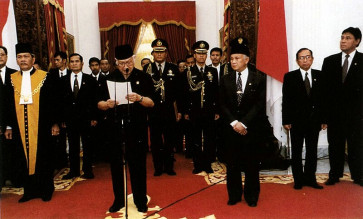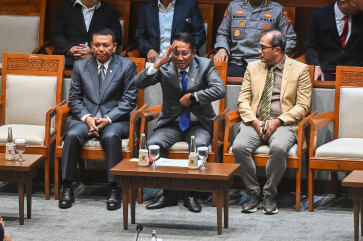Popular Reads
Top Results
Can't find what you're looking for?
View all search resultsPopular Reads
Top Results
Can't find what you're looking for?
View all search resultsDiao Ai Lien: Challenging public perception
A career as a librarian might seem unappealing compared to those prestigious professions that offer luring payoffs
Change text size
Gift Premium Articles
to Anyone
A career as a librarian might seem unappealing compared to those prestigious professions that offer luring payoffs. Indeed, working as a librarian is often associated with low pay and is considered not to be intellectually demanding.
DIAO AI LIEN: (JP/Setiono Sugiharto)
Diao Ai Lien, however, is the exception that disproves such notions.
When she was first offered the job to work as a librarian, she had no reason to turn it down. Undaunted by the profession's dour image, she accepted the offer wholeheartedly.
However, Ai Lien had no first hand experience in working in a library and felt her education background would prove a limitation. For her, any kind of job requires a professional level of commitment.
So she decided to expand her horizons by studying librarianship. Fortunately, she was offered a scholarship to fulfill her wish to study overseas.
Known as a hardworking woman, Ai Lien managed to get a scholarship to study librarianship at the University of Sheffield, the United Kingdom, in 1988.
Soon after completing her master's degree in 1990, Ai Lien, who had previously earned a master's degree in sociology from De La Salle University in the Philippines, decided to continue her studies further.
At the Loughborough University of Technology, also in England, she pursued a PhD in information and library studies -- a field which only a handful of people are interested in.
Ai Lien said a librarian must be empowered to make sure they kept up to speed with the rapid growth of information technology.
However, she admitted that, in the eyes of many people, even those from England, the role of a librarian was still not recognized, let alone appreciated.
Ai Lien recalled the story of her friend, the head of a library in a university in Indonesia, whose staff bachelor's degree in economics was not acknowledged simply because he was assigned to work in the library.
It has become a common perception that in order to be a librarian one doesn't have to hold a degree in certain fields of study, she added.
"For laymen, earning a Ph.D. in library studies to become a librarian is unthinkable. Many people often assume that a librarian's tasks are simply chopping and stamping books. Having a high school diploma is often considered sufficient," Ai Lien said in an interview with The Jakarta Post.
"You might be surprised," Ai Lien added, "that in many university libraries in Germany even a professor from a different study discipline holds a position as a librarian."
Ai Lien lamented over the marginalized position of libraries and librarians as supporting pillars for teaching, learning, and research activities in higher education institutions, including universities.
"The library should not be used as a complementary facility at the university, but must be involved as an integral part of the university itself. It should be seen as 'the heart' of the university."
Ai Lien began her career as a researcher at the Center for Societal Development Studies in 1977. She conducted research on issues including the reproductive health system, communal land rights and the prevention of HIV-AIDS and Sexually Transmitted Diseases.
Now coordinator of Atma Jaya's and the Association of Indonesian Catholic Higher Education's libraries, Ai Lien is still vigorous in conducting research on social-related issues.
She has also been invited to present her views on librarianship in many seminars in the country. Much of what is presented in the symposiums is the result of her experience and extensive research funded mainly by the National Library and by the UNESCO.
In 2004 to 2005, Ai Lien was chosen as one of the researchers of UNESCO's Project on the Development of Information Literacy through School Libraries in Southeast Asian Countries.
Ai Lien has also taught at the School of Psychology, Law and Education at Atma Jaya University Jakarta. And since 1996 she has been thesis advisor and examiner at the Library School of the University of Indonesia.
As the need for easy and quick access to information continues to increase, a sound knowledge of information technology has become vital, she said.
Having worked in the library for many years, Ai Lien went through a valuable experience, which she can now draw on to challenge the common perception that working as a librarian is not intellectually challenging and doesn't call for professional skill.
"I have observed that many students coming to the library are unable to synthesize information they obtain from the search engine," Ai Lien said, adding that a librarian played a crucial role in helping the library's users digest information correctly and effectively.
In this Internet-era, Ai Lie argues, the role of a librarian can no longer be underestimated since the function of a library has undergone a tremendous transformation.
Compared to during the pre-Internet era, it is deemed unnecessary nowadays for a librarian to possess administrative skills, she said.
"What a librarian must now have are information and literacy skills," the soft-spoken librarian said.
The shift from the pre- to post-Internet era has significantly affected the role of the library. This shift undoubtedly calls for professional librarians with sound knowledge not only of librarianship but also of knowledge management and information technology.
Quoting artist William G. Kempster, Ai Lien said "new librarians will come from other backgrounds, and the emphasis will be on leadership, connectivity, innovation and creativity -- making new and powerful connections increasingly on an individual basis between people and their knowledge needs".
In response to the low rate of information literacy among librarians, Ai Lien co-authored a book entitled Tujuh Langkah Literasi Informasi (Seven Information Literacy Steps).
The book, which will soon be published, provides a systematic and incisive exposition of the nature of literacy and the steps necessary for accessing information from anywhere. The steps include problem formulation, information identification, information utilization, evaluation and lesson learning.
It will also be of benefit to students and teachers seeking information for research purposes.
Ai Lien has learned that due to rapid developments in information technology, a professional librarian is required to properly manage a library.
"A library should be run not only by library and information studies graduates, but also by subject and information technology specialists," Ai Lien said.
"They (libraries) should also provide training and consultation on research and writing. Only then can a library be a true partner of the university."










